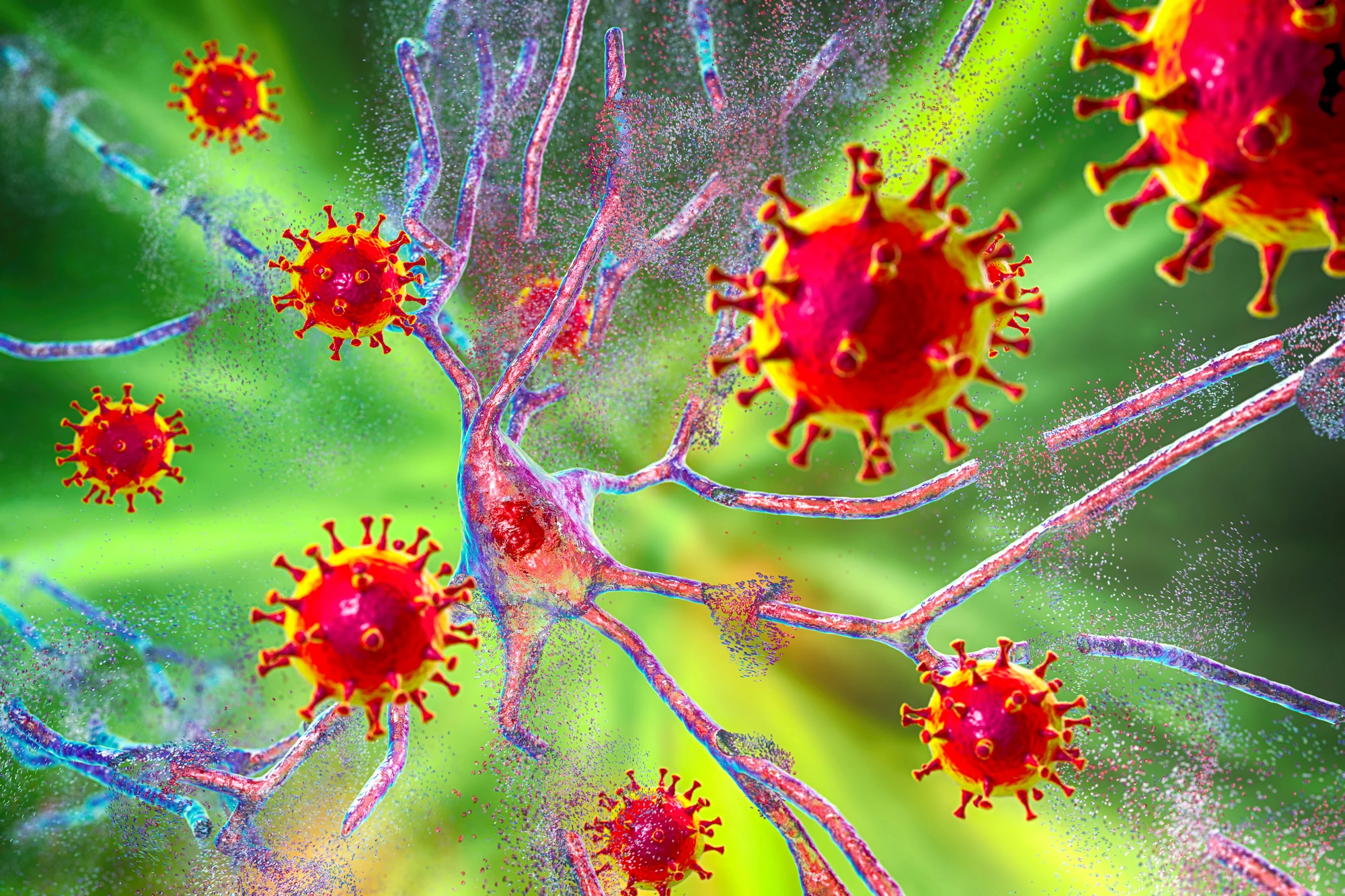Building on a growing body of evidence linking viral infections with neurodegenerative disease, a new study published in Nature Communications has demonstrated how certain molecules on the surfaces of viruses can promote the aggregation of toxic proteins associated with diseases such as Alzheimer’s and Parkinson’s.
The idea that microbial infections can trigger neurodegenerative disease is not new. As far back as the 1950s scientists have been postulating ways an acute viral infection can lead to progressive neurological problems years, or even decades, later.
While evidence for this association is certainly growing, the mechanisms by which viral threats can influence the progression of brain diseases are still resolutely hypothetical. A common hypothesis speculates some viral infections may trigger abnormal immune responses that subsequently linger for years, ultimately generating neurological damage associated with some brain diseases.
This new study proposes a different mechanism linking viruses with brain disease. Across a series of lab experiments researchers investigated how molecules on the surface of some viruses can enhance the spread and accumulation of proteins suspected to cause diseases such as Alzheimer’s.
The research used two kinds of viral surface proteins, also known as viral ligands, in the experiments: a spike protein found on SARS-CoV-2 and a glycoprotein from the virus that causes vesicular stomatitis, a disease affecting livestock. Ina Vorberg, lead on the new research, explains how the experiments demonstrated these viral proteins both induced aggregation of toxic proteins and enhanced the spread of those aggregations between cells.
“We could show that the viral proteins are incorporated both into the cellular membrane and into the extracellular vesicles,” says Vorberg. “Their presence increased protein aggregate spreading between cells, both by direct cell contact or by extracellular vesicles.”
Although this is a novel finding, it is not the first study to propose a mechanism by which viruses can directly accelerate the spread of toxic protein aggregates. A compelling 2019 study demonstrated how herpes simplex virus type 1 (HSV-1) can induce the aggregation of amyloid proteins causing the harmful pathological signs associated with Alzheimer’s disease.
Richard Oakley, head of research at the Alzheimer’s Society, is cautious about drawing any broad conclusions from this new study. He indicates the work is interesting but it doesn’t tell us anything about how viruses can be associated with dementia in a human brain.
“Previous research in the lab has suggested these proteins may spread between cells – this study suggests parts of viruses that help them infect cells might also make it easier for abnormal proteins to enter,” says Oakley. “This work has only been observed in cells in the lab, so we can’t currently say if this interaction happens in the human brain.”
Stephanie Fowler, a research fellow at the UK Dementia Research Institute, calls the new findings “exciting,” offering further evidence of the connection between viral infection and neurodegenerative disease. But perhaps more importantly, Fowler notes the findings could direct researchers to new ways of preventing the progression of brain disease.
“It also highlights the need to better understand which extracellular vesicle surface proteins are involved in controlling the cell-to-cell transfer of their pathogenic cargoes,” says Fowler. “If we can find ways to specifically target and disrupt these processes, new treatments could be developed to slow the progression of disease.”
The new study echoes concerns raised by other researchers regarding the potential long-term consequences of SARS-CoV-2. Last year a team of Australian neuroscientists warned a potential “silent wave” of neurodegenerative disease could be triggered by the COVID-19 pandemic.
An article published in the Journal of Parkinson’s Disease called for increased surveillance of neurological disease over the coming years. The researchers noted a number of ways COVID-19 could soon increase the number of Parkinson’s cases, also citing a spike in Parkinson’s cases was seen in the years following the 1918 Spanish Flu pandemic.
It is still a matter of debate as to whether the SARS-CoV-2 virus directly infects a human brain, or whether the acute neurological symptoms linked to COVID-19 are due to indirect mechanisms such as systemic immune activation. The new study does indicate neuroinvasion by SARS-CoV-2 is plausible, but more research is needed to better understand how this novel coronavirus affects the brain, and whether infection heightens a person’s future risk of developing neurodegenerative disease (ND).
“COVID-19 infections may increase the risk for developing neurological or ND later in life either directly or indirectly but further research is required to clarify potential links,” the new study concludes. “The results presented here argue that research should be intensified to clarify the effect of viruses on prion-like progression of protein aggregation in neurodegenerative and other protein misfolding diseases.”
The new study was published in the journal Nature Communications.
Source: DZNE




